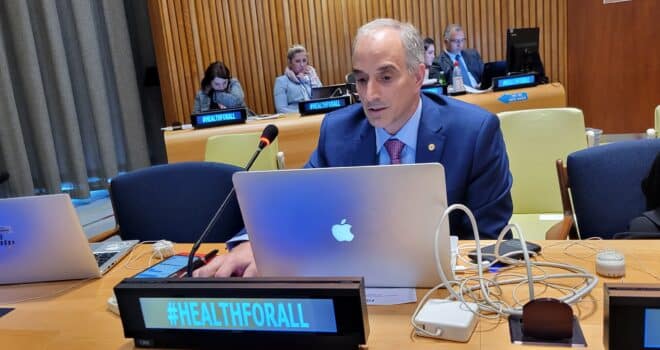This is a statement led by the NCD Alliance and the World Heart Federation at the 76th World Health Assembly on Agenda Item 13.1 Universal Health Coverage.
UHC is for:
• Service coverage: Yet, despite noncommunicable diseases such as cancer and mental health conditions being the biggest global killer – with circulatory diseases alone (including cardiovascular, stroke, diabetes, and kidney disease) causing more than 20 million deaths annually – current global coverage and access to NCD services across the continuum of care is inadequate. UHC will not be achieved so long as half of adults living with diabetes are undiagnosed and unable to access insulin.
• Population coverage: Yet people in marginalised communities have a higher risk of dying from NCDs than the general population. UHC will not be achieved so long as we accept that 85% of premature deaths from NCDs occur in LMICs.
• Financial coverage: Yet globally, financing for NCDs has been stagnant over the last thirty years leaving people living with NCDs feeling the financial burden. UHC will not be achieved unless we break the cycle of generational poverty caused by NCDs.
In 2023 we call for Member States to stand by their commitments to UHC by:
● INVESTING in, financing and accelerating inclusion of, essential NCD services, including for circulatory diseases, across the continuum of care (including prevention, screening, diagnosis, acute and long-term treatment, rehabilitation and palliative care) and across the life-course in national UHC health benefits packages – guided by the WHO Global NCD Action Plan “Best Buys”/Appendix 3,
the HEARTS Technical Package and considering all healthcare providers. 90% of essential interventions for UHC can be delivered through PHC.
● ALIGNING global and national development and health priorities to achieve UHC, breaking down siloed approaches to funding and implementation in health systems.
● ENGAGING people living with NCDs to keep UHC people-centered, including by formalising opportunities for meaningful involvement of civil society in UHC governance and decision-making roles for policies and services.
NCDs are a national issue, a global development issue, an equity issue. We must accelerate UHC implementation by including quality NCD prevention and care services in country UHC health benefit packages.
Statement led by: NCD Alliance and World Heart Federation Supported by: Global Alliance for Tobacco Control, International Association for Hospice and Palliative Care, International Diabetes Federation, International Pharmaceutical Federation, International Society of Nephrology, PATH, The Royal Commonwealth Society for the Blind, Union for International Cancer Control, World Cancer Research Fund International, World Stroke Organization


